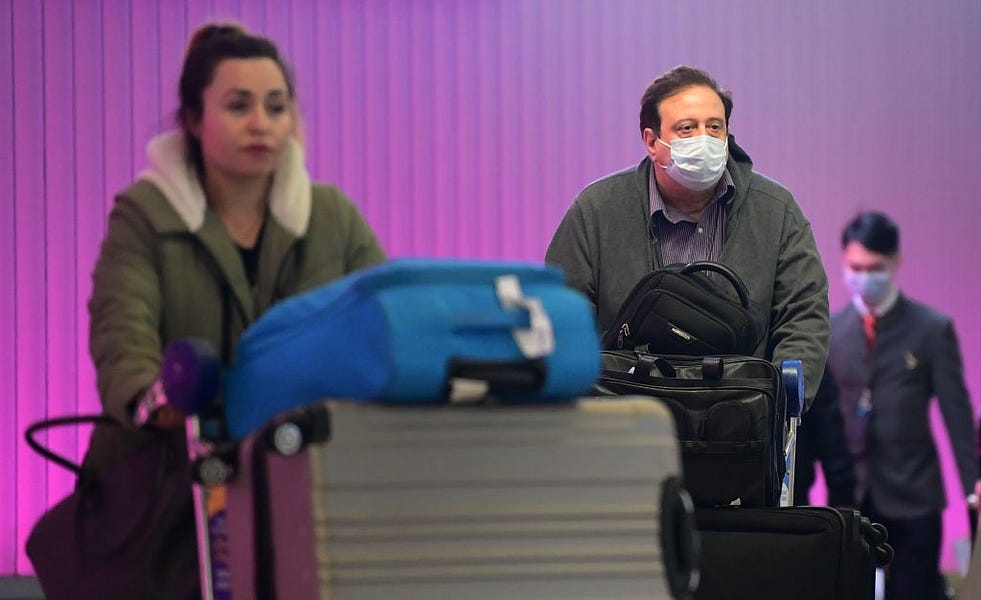On Thursday, President Donald Trump claimed that anyone who enters the United States is required to be tested for coronavirus.
“We have them very heavily tested,” said Trump. “If an American is coming back or anybody’s coming back, we’re testing. We have a tremendous testing setup where people coming in have to be tested.”
He continued to say that anyone who does test positive won’t be sent away, but that they will, instead, be quarantined.
“It’s going to be a pretty strong enforcement of quarantine.”
While the CDC now has offices and quarantine stations at 20 airports in the United States—including O’Hare International Airport, Dulles International Airport, and other major hubs of international travel—only travelers from Iran and China are consistently being screened. Per the CDC website: “American citizens, lawful permanent residents, and their families who have been in China or Iran in the past 14 days will be allowed to enter the United States, but will be redirected to one of 11 airports to undergo health screening.”
This screening does not consist of an actual test for the virus. Instead travelers “will be screened for fever, cough, or trouble breathing.”
Any traveler displaying symptoms will be taken to a medical facility for further evaluation. Even travelers who do not display symptoms but have been in the Hubei Province, where the virus originated, will be quarantined for 14 days. Asymptomatic travelers who have traveled elsewhere in China are free to carry out their journey but are informed of symptoms to keep an eye out for and are asked to stay at home as much as possible, since symptoms for the coronavirus don’t typically appear until five days after contracting the virus and an incubation period of up to 14 days is possible.
Some individuals with coronavirus will never display any symptoms, and asymptomatic transmission is possible.
The CDC says that travelers from Europe, Iran, and South Korea “must stay home for 14 days after returning from travel, monitor their health, and practice social distancing.”
Following the president’s announcement that travel from Europe would be limited, the Department of Homeland Security’s Acting Director Chad Wolf issued a statement in which he said American citizens returning from European countries will be required “to travel through select airports where the U.S. Government has implemented enhanced screening procedures.”
Marc Lipsitch, head of the Harvard T.H. Chan School of Public Health’s Center for Communicable Disease Dynamics, said earlier this week that most countries’ screenings are too lax and could miss up to two-thirds of coronavirus cases entering their borders.
Sen. Dick Durbin recently wrote a letter to the CDC asking for increased airport testings, pointing out instances of Americans returning from Italy and not being screened at the airport or quarantined, despite the high prevalence of the virus in Italy. Sen. Durbin also noted that travelers returning from South Korea, another coronavirus hotbed, are not being tested.
And there have been numerous reports of travelers themselves describing their experiences in recent days, returning to the U.S. and being admitted without any testing. Vice News producer Julia Lindau tweeted last week that she had returned to the United States from the epicenter of the coronavirus epidemic in Italy and faced no screening.
Mike McIntire, an investigative reporter for the New York Times, shared that he faced “zero screening, testing or even questions related to coronavirus” when he returned from Paris on Thursday.
Nancy Stone, a former photographer for the Chicago Tribune, said she had a similarly easy time getting through customs at Chicago O’Hare International Airport on her return trip from Madrid the same day.
The president’s claim that travelers entering the United States are required to undergo coronavirus testing—very heavily or otherwise—is false.
Photograph of international travelers arriving at LAX before the travel ban from Europe sets in by Photo by Frederic J. BrownAFP via Getty Images.
If you have a claim you would like to see us fact check, please send us an email at factcheck@thedispatch.com. If you would like to suggest a correction to this piece or any other Dispatch article, please email corrections@thedispatch.com







Please note that we at The Dispatch hold ourselves, our work, and our commenters to a higher standard than other places on the internet. We welcome comments that foster genuine debate or discussion—including comments critical of us or our work—but responses that include ad hominem attacks on fellow Dispatch members or are intended to stoke fear and anger may be moderated.
With your membership, you only have the ability to comment on The Morning Dispatch articles. Consider upgrading to join the conversation everywhere.